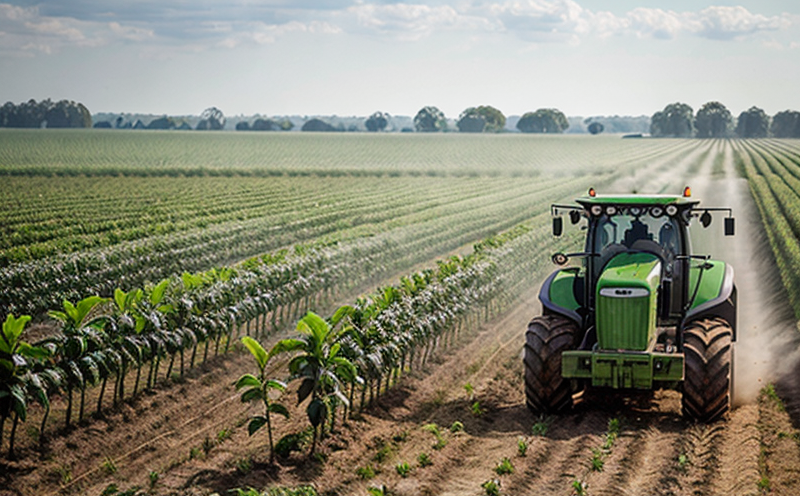GB T 2763 Maximum Residue Limit Testing in Agriculture
The GB/T 2763 series of standards provides detailed guidelines on determining maximum residue limits (MRLs) for pesticides, fungicides, and other agricultural chemicals in various types of crops. This testing is crucial to ensure that food products meet safety and regulatory requirements set by national and international standards.
The GB/T 2763 series is widely recognized within China as a key standard for assessing the residue levels of chemical agents used in agriculture. It helps to protect public health, ensure consumer confidence, and maintain environmental integrity. Compliance with these limits is essential not only for domestic markets but also for exports to countries that adhere to international standards.
The testing process involves several critical steps:
- Sample collection from fields or storage areas
- Suitable preparation of the samples through homogenization and subsampling
- Analysis using advanced chromatographic techniques such as gas chromatography (GC) or liquid chromatography (LC)
The primary goal is to identify any residues that may have exceeded safe limits, thereby ensuring compliance with both domestic regulations and international agreements. This service covers a broad range of crops including fruits, vegetables, cereals, and oilseeds.
Compliance with GB T 2763 is mandatory for producers aiming to enter the Chinese market or those selling their produce internationally. Non-compliance can lead to severe consequences such as product recalls, reputational damage, and potential financial losses. Therefore, it’s essential for companies involved in agricultural production and supply chains to understand and adhere to these standards.
Our laboratory uses state-of-the-art equipment and follows rigorous protocols to ensure accurate results. We employ experienced scientists who stay updated with the latest developments in analytical chemistry and regulatory requirements. Our team is committed to delivering reliable data that can be trusted by all stakeholders involved in agricultural chemical testing.
Why Choose This Test
The GB/T 2763 Maximum Residue Limit Testing ensures that the chemicals used in agriculture do not pose risks to human health and environmental safety. By adhering to these tests, businesses can enhance their reputation as responsible corporate citizens. Moreover, compliance with such standards enhances market access opportunities both domestically and internationally.
Our service offers several advantages over other testing methods:
- Accurate and reliable results
- Compliance with international standards
- Detailed analysis of multiple chemical compounds simultaneously
The test is particularly beneficial for companies dealing with large-scale agricultural production, food processing industries, and export-oriented enterprises. It helps them maintain consistent quality control throughout the supply chain.
By choosing our service, customers receive more than just analytical results; they get comprehensive support tailored to their unique needs. Our team works closely with clients to understand specific requirements and deliver personalized solutions that meet regulatory expectations.
Quality and Reliability Assurance
We are committed to maintaining the highest standards of quality assurance in all our services, including GB T 2763 Maximum Residue Limit Testing. Our laboratory adheres strictly to ISO/IEC 17025 accreditation requirements, ensuring that every test we conduct meets international benchmarks for accuracy and precision.
Our facilities are equipped with cutting-edge instruments such as GC-MS (Gas Chromatography-Mass Spectrometry) and LC-MS (Liquid Chromatography-Mass Spectrometry), which enable us to detect extremely low levels of residues accurately. This capability is crucial for meeting stringent MRL regulations.
Our team consists of certified professionals who hold relevant qualifications recognized by regulatory bodies worldwide. They are trained continuously to stay updated with emerging trends and technologies in the field of analytical chemistry.
To further enhance reliability, we implement robust quality management systems that cover every aspect of our operations from sample receipt through final reporting. This comprehensive approach guarantees consistent performance across all tests conducted at our facility.
International Acceptance and Recognition
The GB/T 2763 series is not only accepted within China but also recognized internationally due to its alignment with global best practices in agricultural chemical residue management. Many countries have adopted similar or identical standards based on the principles outlined by this Chinese standard.
Recognition of these tests enhances market access for exporters and importers alike. It ensures that goods meet not only domestic regulations but also those imposed by importing nations such as the United States, European Union member states, Japan, South Korea, etc.
The global acceptance of GB T 2763 contributes to a safer food supply chain worldwide. By ensuring that agricultural chemicals are used safely and effectively, we contribute to reducing risks associated with pesticide residues in food products.
Our laboratory is dedicated to supporting businesses navigating the complexities of international trade by offering comprehensive solutions designed specifically for their needs. Whether you're an exporter looking to break into new markets or a domestic producer seeking to expand your operations, our expertise can help you achieve compliance efficiently and effectively.





